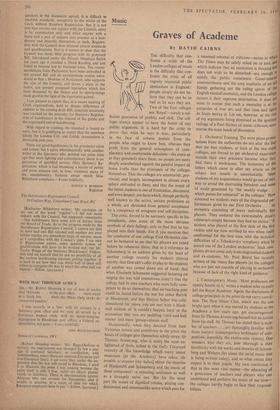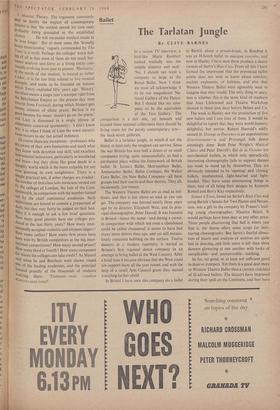M usic
Graves of Academe
By DAVID CAIRNS THE difficulty that con- fronts a critic of the London colleges of music is the difficulty that con- fronts the critic of all vaguely respected public institutions in England : people simply do not be- lieve that they can be as bad as he says they are.
Two of the four colleges are 'Royal'—surely a suf- ficient guarantee of probity and skill. The col- leges always appear to' have the better of any public argument. It is hard for the critic to prove that what he says is true, particularly in the face of urbane denials from The people who ought to know best, whereas they profit from the general atmosphere of com- placency and comfortable delusions—the more so as they genuinely share them; no people are more deeply aniesthetised against the painful impact of home truths than the principals of the colleges themselves. That the colleges are amateurish, pro- vincial, and largely incompetent in almost every sphere entrusted to them, and that the mood of the better students is one of frustration, discontent and even despair, are facts which, though perfectly well known to the active, serious profession as a whole, are shrouded from general acceptance by a conspiracy of smugness and self-deception.
The critic, forced to be narrowly specific in his complaints, cites some of the more obvious symbols of their failings, only to find that he has played into their hands. For if you mention that the conductor of one college First Orchestra can- not be bothered to see that his players are tuned before he rehearses them; that at a reference to Schoenberg in an address given by the head of another college recently his students tittered openly; that Oistrakh's offer to play to the students of another was turned down out of hand; that when Elisabeth Schumann suggested lecturing on singing she was told (monstrous irony!) that the college had its own teachers who were fully com- petent to do so themselves; that no teaching post could be found before the war for either BartOk or Hindemith; and that Matyas Seibcr was cold- shouldered for years, you arc met with a blank- wall attitude of 'it couldn't happen here' or the accusation that you are peddling 'cock-and-bull stories' and mere 'gossip-column stuff.'
Occasionally, when they descend from their Victorian turrets and pontificate in the press, the
heads of colleges give themselves subtly away. Sir Thomas Armstrong, who is easily the most en- lightened of them, talked in the Daily Telegraph recently of 'the knowledge which many senior musicians [at the Academy] have taken the trouble to acquire [my italics] about the theories of Hindemith and Schoenberg and the music of these composers'—a revealing sentiment as well as a strangely naive one. But for the most part the noises of dignified rebuke, pitying con- descension and statesmanlike scorn which pass for
a reasoned rebuttal of criticism—noises in which The Times may be safely relied on to join, and which indicate that an institution is sleeping and does not wish to be disturbed—are enough to satisfy the public conscience. Good-natured amateurishness and the cosy euphoria of an old family gathering are the ruling spirits of th° English musical mentality, and the London c0lle0 system is their supreme incarnation. It does not seem to matter that such a mentality is at the antipodes of true art, and that time and agaill its fruits betray it. Let me, however, at the risk of my arguments being dismissed as the ignorant railings of a Paul Slickey of music criticism,
manse the the main heads of discontent.
I. Orchestral Training. The most pious trot& tations from the authorities do not alter the fact that the best students, at least at the two royal colleges, are forced to get orchestral experience outside their own precincts because what theY find there is inadequate. The testimony of the letters which came in after my article on the subject last month is unmistakable. 'Most students of my acquaintance would go out of their way to avoid the enervating boredom and sense of waste. generated by "the weekly trudge . • which passes for rehearsal" at the colleges.' HoW ashamed we students were of the disgraceful per- formances given by our First Orchestra . . an orchestra consisting of many individually fine players. They endured the interminably dreary rehearsals simply because they had no choice.' 'A student who played at the first desk of the first violins told me how terrified he was when reallY confronted for the first time with the technical difficulties of a Tchaikovsky symphony when be joined one of the London orchestras.' Such coM- plaints do not come only from disgruntled students and ex-students; Mr. Paul Beard has recently written of the 'many fine players [at the colleges] who are just not capable of playing in orchestras because of lack of the right kind of guidance.'
2. Contemporary Music. `Most professors are openly hostile to it,' writes a student who recentlY left the Royal Academy. Again, the disclaimers of college principals in the press do not carry convic- tion. The New Music Club, which was the one bright spot when it was started by students at the Academy a few years ago, got encouragement from Sir Thomas Armstrong himself but no tuition from his staff. Sir Thomas has stated that 'a num- ber of teachers . . are thoroughly familiar with these matters' (contemporary techniques of com- position, especially the twelve-note system). One wonders who they are, how thorough is their familiarity with the works and theories of Schoen- berg and Webern (let alone the serial music that is being written today), and to what extent they impart it to their pupils. My own conviction is that in this most vital matter--the educating of a generation of teachers and players who can understand and perform the music of our time-- the colleges hardly begin to face their responsi- bilities. 3. Musical Theory. The argument commonly used to justify the neglect of contemporary sYstems is that 'the student spends his time most Profitably being grounded in the established cklassics. • . . He will encounter modern music as !le lives longer. But in most cases the 'broadly biased musicianship' vaguely commended by The • lines is a myth. Perhaps the colleges' worst fail- 4'g of all is that most of them do not teach liar- inmic analysis and form as a living entity con- !nil-14Y evolving from past to present. 'Harmony,' in the words a one student, `is treated as rather a joke% it is far too little related to live musical examPle, and tends to be founded on notions which Tovey exploded fifty years ago. 'History' to often means a single year's scamper right from the Babylonian Empire to `the present day' (one "cerPt from Firebird), during which Mozart gets twentY minutes of dilute praise, Berlioz is no good because his music 'doesn't go on the piano,' ea InadLa Liszt is dismissed in a single phrase of b o r contrived spontaneity : 'I don't know "Y it is, when I think of Liszt the word meretri- cious occurs to me' (an actual instance). Of course there are exceptions—professors who are aware of their own limitations and teach what !bey know with devotion and skill, and excellent instrumental instructors, particularly in woodwind and brass—but they shine like good deeds in a naughty world which is the more culpable for not even guessing its own naUghtiness. There is a 8imPle practical test, if other charges are evaded : the number of first-class solo musicians turned out bY the colleges of London, the hub of the Corn- rnunvvealth, in comparison with the number turned ut by the chief continental academies. Such institutions are bound to contain a proportion of duds; but they may fairly be judged on their best. "ere it is enough to ask a few brief questions. HOW many great pianists have our colleges pro- duced in the last thirty years? How many inter- nationally accepted violinists and eminent singers? How many cellists? How many first prizes have been won by British competitors at the big inter- national competitions? How many second prizes? HOW many third or fourth? How many composers fur whom the colleges can take credit? As Maurel said when he and Beecham were shown round kt3ne Of the leading academies, and the principal "°asted proudly of the thousands of students 7,udY1ng there: Tionnant—mais c.ombien ce artistes avez-vousr



































 Previous page
Previous page